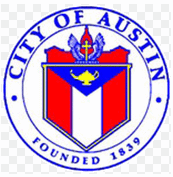
City of Austin Seal
I would like to congratulate Austin Mayor Lee Leffingwell and the City Council for holding its first Small Business Summit in March.
Forty of us were invited by Council Members and the Austin Independent Business Alliance to come and give our thoughts on the major ways the City could address business owners concerns. I was invited to participate by Council Member Laura Morrison, who was the former President of the Austin Neighborhoods Association among her other achievements.
As a small business activist with almost thirty years of talking, testifying, watching and waiting, it was nice to see old comrades and make new allies. It was also nice to be included in this new effort to support small business. To me, Austin’s small business and entrepreneurial history is as relevant to this discussion as the latest news.
At my table were hotshots including the keynote speaker Lemeul Williams of Uptime Devices, long time retailer and commercial landlord Lynn Raredon, Laura Trzpit, the General Manager of one of Austin’s unique spaces Casa de Luz, Jimmy Flannigan from Site Street, a web hosting and design firm that helped keep Choose Austin First members connected, and newcomer Nicole Rogers who is starting an IT training business.
The Summit was limited to two hours. Pretty short and sweet. The first half hour was devoted to welcome remarks and the keynote. This made our time even shorter.
We had been asked to prepare to discuss three questions:
1. What steps could the City take to better assist small local business owners with planning and development?
2. What steps could the City take to help create a better overall environment for small local business owners to succeed?
3. What are some specific obstacles you have encountered in interacting with the City, and how do you believe these could be addressed?
With the help of our facilitator, Lupe Morin, a former City staffer, we determined the issues for our table. Then we were given three minutes to present those to the whole group. A total of about sixteen different items were presented as needing City attention with several “dittoes” as time got shorter and other tables came up with similar issues.
By an odd quirk of fate, this very “public” meeting had not been posted in advance. This meant that the Mayor and Council had to rotate through the 90 minutes of discussion making sure there was never a quorum present in the room so they would not violate the Open Meetings ruling. From my perspective, it meant that Council Members got only a partial picture.
My Concerns
Without taking anything away from the Summit or the report that is being assembled by Rosie Jalifi and the City’s Small Business Development Program staff, I want to mention four concerns I have.
1. No context.
Because we did not hear the discussion at the other tables and were only presented with the issue as part of a list, it is hard to tell if some of the concerns people listed were universal or more industry specific for instance, home owners vs music venues; certain kinds of permitting; the power of the Neighborhood Associations. I presented for our table and found it hard in such a short amount of time to help the other tables understand the context of our issues. I know the other presenters had a similar problem.
Since each Council member only heard part of the discussion, I believe their perception is even more compromised. How these are presented in the report is going to be very interesting and a real challenge for staff.
2. Size considerations.
Small is a relative term. At the federal level, it refers to those with less than 500 employees. State definitions generally use 100 employees as the cutoff and then use another term for an even smaller firm, a “micro business”, one with less than 20 employees. In the Austin area, over 80% of our small businesses are really micro businesses where the owner is the owner/investor, manager, and employee.
Again, it would be useful for Council and staff to know what the issues are by size or complexity of the business. It does make a difference when it comes to deciding where the City can or should make changes. As one of these “micro” businesses and as someone who works exclusively with owners of enterprises of this size, I can guarantee you we look at life and work differently than Yellow Cab, one of the other Summit participants.
3. Not enough clarity. Not enough time.
The Summit could have focused on identifying problems or recommending solutions. I think it tried to do too much in too little time. As a result, what I heard from the three-minute presentations from the other tables was a mixture of both. I am not sure what conclusions I would draw if I were either staff or Council.
For many years in the 90’s, Texas regularly held the Governor’s Conference on Small Business. Business owners from all over the state gathered to talk about problems and issues and propose solutions. Then we went to work to get it done. It was great brainstorming and strong networking. This ended in about 2000 and NFIB (National Federation of Independent Business) and other groups started to hold Small Business Legislative Day. Not as good but better than nothing.
As a former delegate to the Governor’s and White House Conference and Congressional Summit on Small Business, I have seen real change come from this kind of event. My feeling is that this takes more time than two hours on one day in March.
4. The beginning or the end.
This is my biggest concern.
The Austin City Council has started something with this Small Business Summit. It could really be of major assistance to the City’s desire to remain a great place to start and run a business. Or it could be just a “two-hour trick pony”, a false start leading nowhere. My hope that is that this gets more attention and resources and that it continues.
Austin has made some efforts. For years, we have had City Commissions for minority and women-owned business. Good work has been done but not enough. In addition, this has left out other businesses and divided the small business community into two camps. The economic pie is too small for that to continue.
It is time that Austin find ways to support a united small business community while recognizing that we do have some unique concerns because of our size and industry differences.
At the Summit, Mayor Leffingwell talked about our contribution to job creation and also to maintaining jobs. We also contribute to the uniqueness of Austin that comes from having a large number of locally owned and operated lifestyle businesses. We are an important part of Austin’s quality of life now and hopefully always.
As I have before, I will wait and see how the issues are reported. As I have already done, I will present my concerns to Council Members who I think really want to hear from small business owners like me.
Recommendation to Other Owners
If you own a business, I encourage you to get involved. Pay attention to what is happening. What happens in Washington is important but a long way away from here. What happens in Austin, happens to you and works either for you or against you.
I am also interested in what are your concerns and issues. Please post a comment or contact me directly at triplett@ownersview.com. I look forward to continuing this effort whether you are from Austin or elsewhere. Your insights are relevant, too.






If the City has this much trouble doing something relevant, perhaps it’s time for such organizations as the Austin Independent Business Alliance or Transition Austin to put our heads together and present our concerns formally.
http://www.ibuyaustin.com/
http://www.transitionaustin.org/